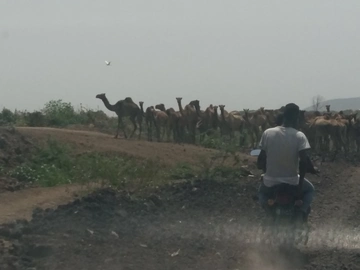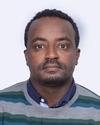How urban and rural spaces in Africa are interlinked
May 20, 2020.
Mekdim Dereje Regassa is a junior researcher from Ethiopia who writes his doctoral thesis at ZEF on “Rural-Urban Linkage and Household’s Welfare in Sub-Saharan Africa”. The interview was conducted by Andreas Haller via E-Mail.
Could you please tell us a little bit about your research?
I study how geography determines economic development. Specifically, I investigate if and how proximity to urban areas of different size and type influences household welfare in sub-Saharan Africa. Previous empirical studies establish that households in rural areas are, in general, poorer, less productive, and more susceptible to price risks than households in urban areas. However, this broad conclusion conceals two key points that have become more evident owing to recent developments in the region. First, rural and urban areas are not distinct spaces. Rapid urbanization, improvements in infrastructure networks and developments in information and communication technologies have blurred the distinction between the two spaces. Now, it is widely acknowledged that rural and urban areas coexist along a continuum with many in-between stages. Second, urban areas are not homogeneous and different urban areas can have different degrees of influence on their surrounding population. Therefore, a proper empirical study that deals with a rural-urban linkage requires an objective measure of the level and dynamics of urbanization. My thesis addresses these issues. I employ a continuous measure of urbanization – nighttime light – to simultaneously account for the continuum between rural and urban areas as well as the heterogeneity of urban areas. By examining one of the understudied underlying factors of spatial development – public service delivery, I also aim to forward a menu of policy recommendations to address the high turnover and low motivation among agricultural extension agents.
Which insights did you get thus far?
In countries like Ethiopia, the physical distance of a household from roads, markets and urban areas is not a robust measure of remoteness. Households at similar distance to town could experience different access to market and economic opportunities depending on the existence and quality of infrastructure, telecommunication, degree of market competitiveness, and personal network. While location of residence and proximity to urban areas in general matters, the size and economic base of the urban area equally matters for welfare. Specifically, intermediate towns, in contrast to small towns and the capital city, seem to lead to growth that is more inclusive.
What were your experiences during the field research? Did you encounter any problems or challenges, or were there any pleasant surprises?
There is a huge benefit in preparing the field research well before traveling to the actual survey location. An extensive review of the place of study and preparation of the survey instruments is helpful to avoid unpleasant surprises. It also helps to check for existing conflicts and labor strikes in the study area during field visits. In my case, fortunately, there was only one minor incident when my focus group discussion was disrupted by gang violence. A pleasant surprise was to see that the expansion of irrigation is altering the dynamics of the rural labor market in Ethiopia. Given the large unemployment rate and the potential of rivers and underground water in the country, I came to believe that small-scale irrigation holds a huge potential to transform the agricultural sector.
How does your research benefit from your participation in the doctoral program at ZEF?
The doctoral program at ZEF offers a commendable academic and welcoming environment for aspiring international students. Bonn is a calm and hospitable city and due to the availability of several international organizations, it provides an opportunity to experience intercultural working and living conditions.
What are your plans for the future after you finish your PhD?
I would like to work on human capital development, particularly on health and education of children, in an academic research organization.



